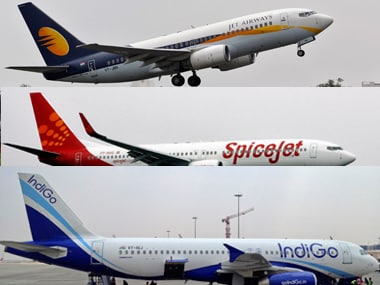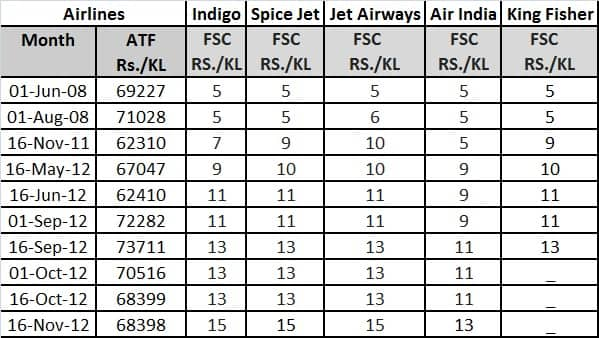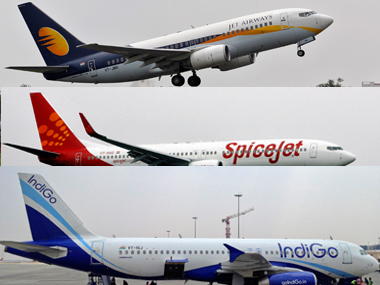New Delhi: It is not often that private airlines are left fuming over an order passed by the Competition Commission of India. But yesterday’s order seemed to come as a shock to each of the three airlines, Jet Airways, IndiGo and SpiceJet. Each claimed it had not violated any provisions of the Competition Act and will likely appeal against the order. [caption id=“attachment_2510586” align=“alignleft” width=“380”]
 Facing CCI ire. Reuters[/caption] This is what happened. On 16 November 2012, the price of jet fuel in Delhi was Rs 68,397.52 per kilo litre. This was a 17 percent increase over the price in May 2008. Since mid-2008, domestic airlines had begun levying a “fuel surcharge” for transporting cargo which was over and above the standard charges already in force. Airlines justified the surcharge by saying that fuel prices were going through the roof and cargo transporters needed to bear the additional costs. According to an analysis done by logistics companies’ umbrella body Express Industry Council of India (EICI), the fuel surcharge levied by airlines on cargo transportation on 16 November 2012 was up 200 percent over the same May 2008 date when fuel prices had increase by just 17 percent. EICI allegedly found other discrepancies too by airlines - like hiking surcharge sometimes when fuel prices were actually going down and refusing to have any international benchmark for fixing this surcharge. After multiple warnings and letters to airlines seeking a justification for levying any arbitrary amount as fuel surcharge for cargo, EICI filed an appeal with the Competition Commission of India in 2013. On Tuesday, in a victory of sorts for EICI, the commission has upheld its contentions on fuel surcharge and levied a combined fine of Rs 258 crore on Jet Airways, SpiceJet and IndiGo. Air India and GoAir have not been found guilty of any violation and thus spared penalties. Speaking to Firstpost, EICI COO Vijay Kumar said India’s airlines do not have any benchmarking for the surcharge when other logistics companies world over, like Blue Dart and FedEx, do. “Blue Dart has linked this surcharge to brent crude prices where FedEx has linked it to the US energy prices. We wrote to each domestic airline in 2010 and again in 2011 asking for a benchmark but nothing came of it. We then filed an appeal with CCI,” Kumar said. As per the CCI statement, penalties have been imposed on the three airlines for “concerted action in fixing and revising fuel surcharge for transporting cargo”. The commission noted that the airlines “acted in parallel, in collusion in fixing FSC rates. Such conduct was found to have resulted in indirectly determining the rates of air cargo transport and thereby in contravention of the provisions of section 3(1) read with 3(3) of the Act”.
Click here to know more about fuel surcharge analysis by EICI
This is a snapshot of ATF prices charged by oil companies keeping Delhi as a reference point for a few fortnights and the corresponding FSC charged by airlines. The data is in the descending order of ATF prices.
Facing CCI ire. Reuters[/caption] This is what happened. On 16 November 2012, the price of jet fuel in Delhi was Rs 68,397.52 per kilo litre. This was a 17 percent increase over the price in May 2008. Since mid-2008, domestic airlines had begun levying a “fuel surcharge” for transporting cargo which was over and above the standard charges already in force. Airlines justified the surcharge by saying that fuel prices were going through the roof and cargo transporters needed to bear the additional costs. According to an analysis done by logistics companies’ umbrella body Express Industry Council of India (EICI), the fuel surcharge levied by airlines on cargo transportation on 16 November 2012 was up 200 percent over the same May 2008 date when fuel prices had increase by just 17 percent. EICI allegedly found other discrepancies too by airlines - like hiking surcharge sometimes when fuel prices were actually going down and refusing to have any international benchmark for fixing this surcharge. After multiple warnings and letters to airlines seeking a justification for levying any arbitrary amount as fuel surcharge for cargo, EICI filed an appeal with the Competition Commission of India in 2013. On Tuesday, in a victory of sorts for EICI, the commission has upheld its contentions on fuel surcharge and levied a combined fine of Rs 258 crore on Jet Airways, SpiceJet and IndiGo. Air India and GoAir have not been found guilty of any violation and thus spared penalties. Speaking to Firstpost, EICI COO Vijay Kumar said India’s airlines do not have any benchmarking for the surcharge when other logistics companies world over, like Blue Dart and FedEx, do. “Blue Dart has linked this surcharge to brent crude prices where FedEx has linked it to the US energy prices. We wrote to each domestic airline in 2010 and again in 2011 asking for a benchmark but nothing came of it. We then filed an appeal with CCI,” Kumar said. As per the CCI statement, penalties have been imposed on the three airlines for “concerted action in fixing and revising fuel surcharge for transporting cargo”. The commission noted that the airlines “acted in parallel, in collusion in fixing FSC rates. Such conduct was found to have resulted in indirectly determining the rates of air cargo transport and thereby in contravention of the provisions of section 3(1) read with 3(3) of the Act”.
Click here to know more about fuel surcharge analysis by EICI
This is a snapshot of ATF prices charged by oil companies keeping Delhi as a reference point for a few fortnights and the corresponding FSC charged by airlines. The data is in the descending order of ATF prices.
 It is clear from this data provided by EICI that the surcharge was similar for most airlines on most days therefore perhaps the charge that they were forming a “cartel” in deciding the levy. A SpiceJet spokesperson said, “Earlier, CCI investigation was in favour of airlines. Today’s order is being examined and we are likely to file an appeal against it.” IndiGo said the company will take legal steps to challenge the order at the appropriate forum. “The company has been legally advised it is not in contravention of provisions of the Competition Act 2002.” Jet also said it had violated the Act and would pursue legal options. The reference by one airline to the investigation report in CCI before the final order is rather interesting. Clause 24 from the CCI judgment in fact criticises the investigation which had exonerated the airlines saying, “Heavy criticism was made of the “interesting” procedure followed by the DG in asking the airlines if they had indulged in a cartel, and if so, to produce the relevant documents. It was vehemently submitted that if such a procedure was followed to detect a cartel, no conclusion of cartelization could ever be reached.” The judgement further added that “It was also alleged that the DG failed to approach any third party regularity authority to obtain details of exchange of phone calls, messages, e-mails or other similar exchange of information which took place between the airlines over such a long period of time.”
It is clear from this data provided by EICI that the surcharge was similar for most airlines on most days therefore perhaps the charge that they were forming a “cartel” in deciding the levy. A SpiceJet spokesperson said, “Earlier, CCI investigation was in favour of airlines. Today’s order is being examined and we are likely to file an appeal against it.” IndiGo said the company will take legal steps to challenge the order at the appropriate forum. “The company has been legally advised it is not in contravention of provisions of the Competition Act 2002.” Jet also said it had violated the Act and would pursue legal options. The reference by one airline to the investigation report in CCI before the final order is rather interesting. Clause 24 from the CCI judgment in fact criticises the investigation which had exonerated the airlines saying, “Heavy criticism was made of the “interesting” procedure followed by the DG in asking the airlines if they had indulged in a cartel, and if so, to produce the relevant documents. It was vehemently submitted that if such a procedure was followed to detect a cartel, no conclusion of cartelization could ever be reached.” The judgement further added that “It was also alleged that the DG failed to approach any third party regularity authority to obtain details of exchange of phone calls, messages, e-mails or other similar exchange of information which took place between the airlines over such a long period of time.”
EICI analysis nails it, airlines must explain arbitrary fuel surcharge levy
Sindhu Bhattacharya
• November 18, 2015, 17:11:12 IST
It is clear from this data provided by EICI that the surcharge was similar for most airlines on most days therefore perhaps the charge that they were forming a “cartel” in deciding the levy.
Advertisement
)
End of Article